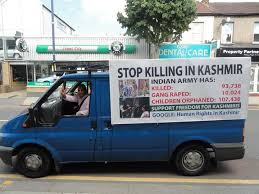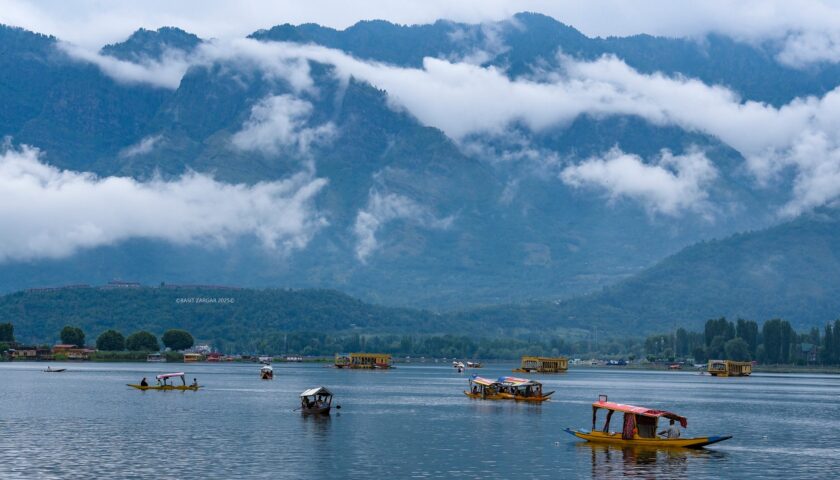The purpose of this paper is to provide you with a plan to mount an educational and awareness campaign in support of self-determination in Jammu & Kashmir and to enlist the support of foreign embassies in your country, NGO’s (both international and national) and media (both international and national) to persuade India and Pakistan to include Kashmiri leadership in any future dialogue that will lead to the settlement of the Kashmir dispute.
 Your objective should be to build support for the active involvement of the world powers and the United Nations to help resolve the Kashmir dispute in accordance with the aspiration of the people and United Nations Security Council resolutions.
Your objective should be to build support for the active involvement of the world powers and the United Nations to help resolve the Kashmir dispute in accordance with the aspiration of the people and United Nations Security Council resolutions.
Your strategy has to be a part of a process to build momentum and create opportunities to show these officials how active support for a referendum in Kashmir can further the interests of their respective countries in the region of South Asia.
Your challenge will be to provide the officials of the embassies and representatives of the NGO’s and media with specific ideas for future policy actions and decisions. The ideas must be sound, concrete, tangible and realistic.
Your meeting with them must be more than educational. It must move forward the political dialogue that can ultimately lead to more extensive tripartite discussions between India, Pakistan and Kashmiri leadership.
Foreign Embassies:
The world powers must realize that:
(i). The Kashmiri people could be instrumental in providing a ‘way out’ of this cycle of violence and period of uncertainty. Kashmiris are an educated people. They have a recorded history of five thousand years. They have a skilled workforce. The Jammu & Kashmir itself is rich in natural resources including an abundance of fertile land and vast waterways which could produce enough hydroelectric power to support not only Kashmir but parts of India and Pakistan as well.
(ii). Given a chance, Kashmiris could govern themselves as an independent country, develop a thriving economy and international tourism.
(iii). They could be instrumental to encourage peace and stability not only in the subcontinent but in Afghanistan as well. As many experts of international relations now publicly say that the key to peace and stability in Afghanistan lies in Kashmir.
(iv). Adhering to the status quo will lead to more bloodshed and greater instability.
(v). Kashmiri leadership is not a problem but rather a part of solution.
(vi). One cannot deal with the tensions between India and Pakistan without simultaneously addressing the bone of contention of these tensions – that is Kashmir.
Your campaign to reset the agenda should focus on effective ‘re-education’ campaign because there is a vacuum of information about Kashmir.
Non-Governmental Organizations (NGO):
Your strategy has to be to establish relationship with the NGO’s (both international and national) that represent a diverse spectrum of viewpoints.
The international NGO’s play a critical role in shaping foreign policy of major world powers, through studies, backgrounders, issues memorandums, seminars and conferences. They are looked at by foreign policy agencies as powerful sources of information on many complex issues.
The reports put out by these organizations are read by many of the key decision-makers. These institutions are therefore a direct and influential link to the people who are crafting foreign policy towards Kashmir.
Media:
(i). The media relies on these institutions for their analysis and uses their expertise for comment in writing stories.
(ii). A timely editorial or opinion piece or article can influence the outcome of a debate and encourage a shift in policy. By generating stories on Kashmir, you will draw the attention of the foreign policy agencies and ultimately persuade them to take interest in the Kashmir cause.
(iii). Individual letters to editor always play an important role. The letters should always be signed. They should include personal experience of the individuals, their family and friends. In this way, each letter becomes a personal plea to the editor from a concerned citizen.
(iv). The media is a tool to crystalize the growing support for right to self-determination and to transmit information of the human rights violations in Kashmir.
Not only have most NGO’s not focused many of their resources on the recent events in Kashmir, many do not even have specialists who are well informed on India and Pakistan relations. Remember that most of these NGO’s do not have any built-in biases. We can therefore become a source of information for them.
Indian Disinformation Campaign:
You can be sure that the Indian lobby, much larger than yours has wasted no time in voicing their opposition to what they term ‘separatism’ fundamentalism’ and ‘terrorism.’ Their successful efforts have effectively eclipsed the root cause of the instability in the region: the unfulfilled United Nations pledge of self-determination for the people of Jammu & Kashmir.
The influence of the Indian lobby has enjoyed virtually unchallenged activity at world capitols.
The world powers have repeatedly heard the various pro-Indian position themes. These include:
(i). Kashmiri militants threaten to destabilize delicate India – Pakistan relations.
(ii). Fundamentalists Muslims, if victorious, will bring instability and undemocratic ideas to an independent country.
(iii). The current violence in Kashmir is an internal matter of India.
Our Response:
Our efforts have to be designed to provide information that supports the positive themes that strengthen our position.
Remember, never exaggerate the events. Why to exaggerate when your story is true in the first place!
We must combat the Indian disinformation campaign by providing direct, positive and substantive information.
There are several themes that will be Important to promote. These include:
(i). The international community has long supported the right of the people of Kashmir to decide their future.
(ii). The Kashmiri leadership stands for an equitable and peaceful resolution of the dispute in accordance with the wishes of the people of Jammu & Kashmir.
(iii). The debate between India and Pakistan cannot be resolved without the involvement and participation of the Kashmiri leadership.
(iv). World powers should provide humanitarian relief to those who were affected during the recent floods of 2014.
How to Request a Meeting:
A letter requesting a meeting with foreign embassies in your country, NGO’s and media should be sent at least two weeks ahead of time. The letter should identify a specific date, time block for the meeting. Without specificity, the meeting would be postponed indefinitely. Accompanying the letter should be brief information on the ‘Youth Forum on Kashmir’, some recent news clippings from the international NGO’s, like Amnesty International, etc.
The letter should be followed up with a phone call. If there is no immediate follow up by phone call, there will be no meeting.
There should be no more than two to three other persons in the meeting with you. Each person should have a specific role. For example, one individual may have family or friend in Kashmir with whom he communicates. The other person may be an expert on the history of Kashmir. A third may have read a report about the situation in Kashmir. If you feel that you don’t have a distinct role, you should not attend the meeting.
During the meeting, you should always submit an “Aide Memoir” (Briefing paper) on the current situation.
(i). Be firm and persuasive but polite in your approach.
(ii). You should always emphasize the peaceful political settlement of the Kashmir dispute.
(iii). You must effectively address the issue of self-determination and the issue of human rights violations with documentation.
(iv). Define your ‘Organization’, its objectives and activities. Emphasize that your organization does not represent any particular opinion but over all sentiments of the people of Jammu & Kashmir.
(v). Briefly retrace the history of the conflict. Emphasize that Kashmir has always been an issue of international concern since the 1948 Security Council resolution. It is not an internal matter of any country.
(vi). Discuss the current crisis situation, emphasizing the atrocities, disappearances, AFSPA, ceasefire violations and political prisoners.
(vii). Point out that while tensions between India and Pakistan can be reduced, there will be no long term stability in the region until the legitimate rights of the people of Kashmir – right of self-determination is addressed.
(viii). Urge them to persuade their governments to send a fact-finding mission to both sides of the Ceasefire Line to gather first hand information about the situation.
(ix). Seek their support for inclusion of a statement on the situation in Kashmir in the forthcoming session of the United Nations Human Rights Council in Geneva.
(x). You must elaborate the futility of bilateral talks between India and Pakistan which have proven barren for the last 67 years. Your demand must be tripartite dialogue between all parties concerned – India, Pakistan and Kashmiri leadership.
(xi). You must develop a script that addresses all of the above issues within 30 minutes, the remaining time will be dedicated to question and answers in order to elaborate on previous points.
As a follow-up, you should sent a thank you note to the office and stay in regular contact with those in the meeting through correspondence and phone contacts.
Third Party Facilitation:
The world powers are in quandary. They continue to support India because of its emerging commercial market while at the same time, they support the advancement of democracy in the world. It is therefore, only natural that they would like to give, at least an appearance of being tolerant to the situation in Kashmir.
A convenient way to side step the conflict is to suggest that India and Pakistan directly negotiate an end to the conflict. This permits them to be on record as neither supporting one side or the other. This evenhandedness, though, is working against the interests of the people of Kashmir.
“What worries me is not the strident clamor of the bad people, but the appalling silence of the good people.” (Martin Luther King)
The recent rhetorical volley between India and Pakistan at Ufa, Russia provided the backdrop for heightened concern of US, Russia and China over the recent tensions between India and Pakistan. That prompted a direct involvement of those world powers in supporting a lowering of hostilities between two disputants. Call it mediation or facilitation or deeper engagement, it really does not matter. In reality, it was the third party involvement that brought India and Pakistan together at Ufa, Russia.
Responsibility of Kashmiri Leadership:
Efforts underway at this point demonstrate that the world powers are looking for a vehicle (Mandela) for dialogue. Can that vehicle be APHC? Let us think over it.
Please remember that the success of your efforts depends on your ability to demonstrate that effective leadership does exist in Kashmir. Without a united leadership, it will be impossible to move the Kashmir debate from the subject of human rights violations to the ultimate goal of self-determination.
A difficult concept for the world powers to understand remains the deep division within the Kashmiri leadership and the resulting confusion over who speaks for Kashmiris. This suggests that a plan of governance needs to be drafted that articulates the objectives of the leadership that the world powers can support.
Imagine, if on July 21st, 2015 the Kashmiri leadership could have shown collectivity and togetherness to either attend or not to attend the Iftaar party in New Delhi, the impact would have been unimaginable.
Conclusion:
In summary, the various elements of your strategy – foreign embassies, NGO’s and media – are integrated segments, each of which effects the other to move your strategy forward. Each section of the strategy is as important as the other in progressing toward our ultimate goal of self-determination for the people of Jammu & Kashmir.
Dr. Fai can be reached at: 1-202-607-6435 OR gnfai2003@yahoo.com




